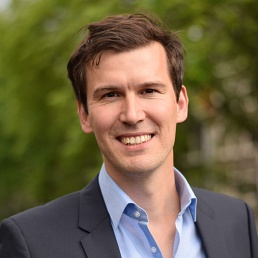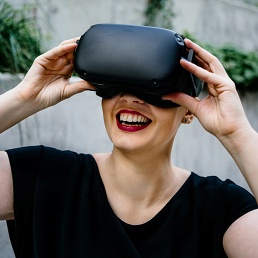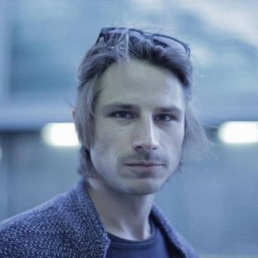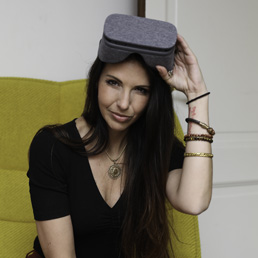Increasingly often we escape the real world by diving into virtual reality, thanks to Virtual Reality (VR), Augmented Reality (AR) or Mixed Reality (MR) solutions. Film narration changes following technological developments that allow viewers to become part of the story. Viewers enter artificial reality where they experience not only strong emotions, but also an illusion of being in a virtual body. New and improved immersive technologies allow us to experience being in another world with an increasing sense of presence. Does a line between the real and virtual world still exist?
During the upcoming event in the HumanTech Meetings series, organized by SWPS University’s HumanTech Center for Social and Technological Innovation, we will talk less about practical solutions for psychologists and, instead, we will have an opportunity to hear from two renowned researchers, Professor Krzysztof Pietroszek from American University, in Washington, USA and Professor Tilo Hartmann from Vrije Universiteit, in Amsterdam, The Netherlands, about their perspectives on the development and understanding of virtual reality, where year to year, people spend increasingly more time.
The meeting will be hosted by Dr. Konrad Maj.
Due to the pandemic, the meeting will take a form of an online webinar.
Lanuages of the event: Polish and English (with translation to both languages).
Registration required.
Joing the live meeting »
November 25
17:00-20:00 CET (GMT+1)
online
HumanTech Meetings
We live in an era of innovation, technological progress and digitalization. This current innovation drive may lead to unpredictable psychological and social outcomes. Therefore, it is crucial to establish collaborations between engineers, programmers, IT specialists and social scientists during initial phases of any new projects related to development of new technologies or services. Such collaborations may help to avoid mistakes and can support better development of new ideas.
The project is planned as a series of meetings, gathering academics and professionals from the technology sector from Poland and other countries. Each meeting will include two lectures, one delivered by a speaker from Poland and one presented by a guest from another country. The lectures will be followed by panel discussions, where panelists will represent different approaches to innovation and technology.
HumanTech Meetings is a project of SWPS University's Center for Innovation. More information »
During our second meeting devoted to the topic of Virtual Reality, we will talk less about practical solutions for psychologists and, instead, we will have an opportunity to hear from two renowned researchers about their perspectives on the development and understanding of Virtual Reality, where year to year, people spend increasingly more time.
Assistant Professor Konrad Maj, Head of the HumanTech Center for Social and Technological Innovation
Lectures
Lecture 1: Artificial Reality Continuum: New directions in immersive storytelling – live streaming »
Virtual, augmented, mixed or extended reality are all aspects of the Artificial Reality Continuum (ARC), a spectrum of technological stimuli that affect our perception of reality. These technologies form a new storytelling medium, with its own vocabulary and grammar. Among available immersive technologies, volumetric capture (recording of “holograms” of actors), once a domain of science-fiction, is set to revolutionize storytelling. Actors can be captured as holograms and set to perform in virtual or real environments. Props, set decoration, or even entire sets can be turned into photorealistic 3D models through a process known as photogrammetry. Stories told in this manner can be viewed using cave system, head-mounted displays, or augmented reality glasses, creating an experience similar to Startrek’s Holodeck.
While the technology is ready for new stories and storytelling techniques, our understanding of the language and grammar of this medium is very limited. In my talk, I will present a comparative analysis of the traditional film language with what we understand so far about the grammar of volumetric filmmaking. I will show examples, including my own, of projects and stories, told using this new medium I will argue that volumetric filmmaking is a new form of storytelling, not a mere technological extension of the traditional cinema..
Krzysztof Pietroszek – is a tenure-track professor in the Film and Media Arts Division of the School of Communication. He is the Founding Director of the Institute for Immersive Designs, Experiences, Applications, and Stories (Institute for IDEAS), an Associate Director of the Center for Environmental Filmmaking, and is also affiliated faculty at the AU Game Lab, and the Department of Computer Science. Krzysztof teaches immersive filmmaking courses in the undergraduate and graduate film programs and game development courses in graduate game programs. Krzysztof holds two terminal degrees: MFA in Film Directing and PhD in Computer Science, enabling him to work across technical domain. His research includes designing and studying immersive stories, coding VR games, and creating virtual, mixed, and augmented reality technologies. As a filmmaker, Krzysztof has produced an award-winning theatrically-released feature film and written/directed a number of short films.
Lecture 2: Feeling present, while knowing it's an illusion: A parallel process model of presence – live streaming »
New immersive human-made technologies like Virtual Reality (VR) or extended reality (XR), but also artificial social agents like robots or humanoids, can provide a compelling sense of presence. Users feel like being spatially located in a virtual environment, they can feel like artificial agents are really alive and socially co-present, and they can even temporarily perceive the virtual body of their own avatar as their actual physical body. Evidence on the technological factors, as well as on the perceptual factors that are evoking users’ sense of presence is growing. However, while the sensation of presence in VR can be really compelling, as if things were really happening, most scholars note that VR users are nevertheless aware, to some degree, that “this is not real or really happening”.
Interestingly, no integrative conceptualization exists to date in VR research that models the phenomenon that users simultaneously and almost paradoxically feel “really present”, while “knowing that it is not really happening”.
In his presentation, Prof. Hartmann will build on closely related existing accounts in other fields (e.g., on the aesthetic illusion, twofold aesthetic perception of pictures, involved vs. analytical reception of narratives) and interdisciplinary research (e.g., on pictorial competence) to propose a parallel processing account of presence.
According to the parallel processing account, while we grow up, we learn to distinguish (mediated) representations from actual objects. As a consequence, if encountering mediated representations, e.g., in VR environments, sensory cues and perception, might give rise to a feeling that this is happening (e.g., “I’m really present”), then through parallel higher-order cognition we stay aware of the fact this is just mediated. According to the present approach, this media awareness does not qualify the presence experience itself (as the presence illusion might be cognitively impenetrable), but it qualifies the impact of presence, e.g., on users’ affect or behavior. In summary, the present conceptualization might enrich our understanding of presence in VR and related new technologies, and might add to a better general understanding of how we process mediated representations.

Tilo Hartmann – is Professor for Virtual Reality and Communication, and chair of the Department of Communication Science at the Vrije Universiteit Amsterdam. In his work, Hartmann links media psychology to other fields of Communication Science. His research primarily focuses on users' subjective experience of media, and particularly media-induced perceptual illusions and media users' subjective and sometimes biased sense of reality. Hartmann publishes in the major scientific journals of the field (e.g., Journal of Communication, Human Communication Research, Media Psychology), and published several books, including "Media Choice: A theoretical and empirical overview." He served as member of the editorial boards of “Journal of Communication”, “Media Psychology”, “Human Communication Research”, as elected co-chair of the “Audience and Reception Studies Division” of the German Communication Association DGPuK, ECREA's audience and reception studies division, and as secretary of ICA's game studies interest group.
Panellists

Katarzyna Koba – is a founder of RoboKoba, a provider of e-learning platforms, and Managing Director at Girls in Tech Poland. She was awarded participation in the “Shesnnovation Academy”, a mentoring program accelerating careers of young women in tech, organized by Perspektywy, Woman in Tech, and CitiBank Handlowy. In 2020, her company was recognized as one of the most innovative start-ups founded by women. In March 2020, she was a finalist of the first online hackathon organized by Virtual Medicine in San Francisco. She also won the 2014 digital_art_now award at Digital_ia, an international digital art festival in Szczecin. Additionally, her art was presented at the 2018 VRLO Microsoft Reactor in London, the 2016 VR Challenge Expo - EC1 in Łódź, Muzeum Sztuki (Art Museum), and the Factory Museum in Łódź. She also exhibited during the FL4K festival in Łódź, at the (Non)presence student work retrospective at the Labirynt Gallery in Lublin, and Granice Rzeźby (Frontiers of Sculpture), an national independent student sculpture exhibition in Warsaw. She graduated from the Department of Visual Arts of the Academy of Fine Arts in Łódź. She was a resident at the FuseBox Hub at the Brighton Immersive Lab, where she developed ideas for professional applications of VR, AR, and MR devices, and body movement and body perception sensors. The program supports digital visionaries and creative technologists, who want to transform their ideas into successful innovations. As an innovation leader in XR, AI and HCI technology, and an educator in the field of interactive media, she prototypes digital and multidimensional environment experiences. As a designer and researcher, interested in therapeutic and educational projects requiring analytical thinking and perception data, she draws on experimental psychology, sensuous anthropology, and the sense of embodiment in virtual reality.

Krzysztof Garbaczewski – is a theatre director, author of adaptations that inspire his so-called theatre installations, which combine performance, visual arts, and music. His trademark collage/syncretic style, the use of video projections, and live transmissions refer to our contemporary cyber-sensibility. Garbaczewski’s productions address the most important existential matters and search for liminal experiences. Garbaczewski graduated from the Faculty of Theatre Directing and Dramaturgy at the Ludwik Solski State Theatre School in Kraków. He is a recipient of numerous awards, such as the “Passport” award granted by a Plish weekly magazine Polityka. His notable productions include "Odyssey" by Homer, "The Sexual Life of Savages", based on writings of a Polish anthropologist Bronisław Malinowski, "The Death Star" by Marcin Cecko, "Balladyna" by Juliusz Słowacki, "The Sky of Stone Instead of Stars" by Marcin Cecko, "Symposium” by Plato, “The Pheasants”, “Liberation” by Stanisław Wyspiański. “Nietota”, based on writings of Tadeusz Miciński. “New Territory” inspired by Jerzy Grotowski, and “Miron Białoszewski/ Allen Ginsberg VR” in New York at The Performing Garage. In 2016, Garbaczewski directed "Robert Robur's Incredible Adventures", based on an unfinished novel by Mirosław Nahacz. He is a founder of Dream Adoption Society, an artistic collective applying virtual and augmented reality in theater, performance, and contemporary art and exploring new technologies to create immersive, performative experiences.

Faviola Brugger-Dadis – is the CEO and Founder of NeuroReality, a medtech company that develops gamified virtual reality (VR) software for cognitive rehabilitation and diagnostics following acquired brain injury. The software, ‘Koji’s Quest,’ is a telehealth solution that can be used to remotely monitor and treat patients, while engaging them in a fun and immersive virtual environment. Faviola completed her Master’s in Cognitive Neuropsychology at the VU University Amsterdam and University of Oxford. She is currently a Doctoral candidate in Cognitive Neuroscience at the Utrecht University and VU University Amsterdam, conducting research that provides scientific efficacy for Koji’s Quest and the use of VR for treatment and screening of acquired brain injuries. She believes innovations such as VR, especially combined with machine learning and AI, have the ability to improve accessibility to healthcare worldwide.
Coming from a diverse cultural background and having lived in 9 countries, Faviola’s philosophy regarding science and innovation has always been to look at ways to solve problems on a global scale. Faviola also believes in making learning accessible to those from all different backgrounds. She is passionate about outreach and to that extent, regularly participates in knowledge transfer at conferences, events, panels, and as a science communicator via social media. She has won a number of awards including the VIVA400 Most Successful Women of 2020 in Healthcare and Education, MedTech Outlook’s ‘Top Neurology Solutions Providers in Europe 2020’, and was a top finalist for Entrepreneur of the Year in Booking.com’s Tech Playmaker Awards 2020.
Meeting Host
Konrad Maj, Ph.D. – Social psychologist, Head of the HumanTech Meetings project, initiator and Head of the HumanTech Center for Social and Technological Innovations. In his research and teaching he focuses on social influence, media psychology and innovations. Recently, he has been working on a Human-Robot-Interaction (HRI) project. From 2013 to 2016 he held the post of Rector’s Representative for Research, focusing on practical application of research results and social innovations. He visited numerous innovation centers, including the Institute for Social Innovation (ISI) at Carnegie Mellon University, Pittsburgh, USA, the ID+ Research Institute for Design, Media and Culture at the University of Averio, Portugal, and Design Factory at Aalto University, in Finland.
Organizer
HumanTech Center for Social and Technological Innovation >>
Partners

Media Support

Sponsors

Date and Location
Wednesday, November 25, 2020, online
Contact
Coordinator: Ewa Łuczak
e-mail: This email address is being protected from spambots. You need JavaScript enabled to view it.
The HumanTech Meetings project is funded by the Ministry of Science and Higher Education, under the “Promotion of Science” funding scheme - contract no. 792/P-DUN/2019.